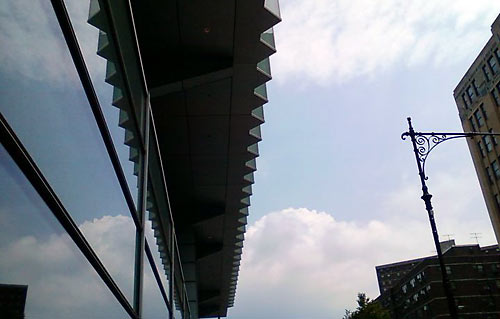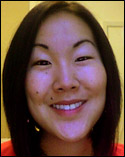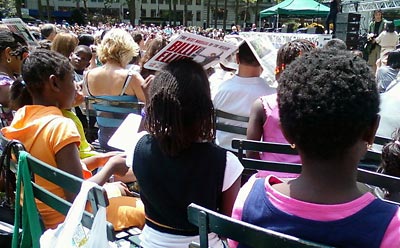 |
Bronx County Hall of Justice building, with residential apartments in the background. (Kony Kim photos) |
Drawn to a career softer and subtler than law, but driven to deal with injustice in the world
Each year the UC Berkeley-based Human Rights Center awards summer fellowships to students from University of California campuses, to enable them to work with human-rights organizations in the U.S. and abroad. Several current Human Rights Fellows, including law student Kony Kim, have agreed to share their experiences this summer, with regular updates from the field to be published on the NewsCenter.
| 22 July 2010
 Kony Kim
Kony Kim
A J.D. and PhD. student at Berkeley Law, Kony Kim aspires to pursue her passions for art and storytelling to become what she calls a "writer-artist-advocate." The daughter of a Presbyterian minister, she received her B.A. in philosophy from Yale (2003) and her M.A. in theological studies at Westminster Seminary (2006). While completing coursework in Berkeley Law's Jurisprudence & Social Policy program, she was inspired by her volunteer work with asylum seekers to focus on refugee rights advocacy, and by her interactions with prison inmates to investigate alternative justice models.
Kim will spend the summer as a legal intern for the Bronx Defenders, which provides legal advocacy and services in one of the country's poorest neighborhoods. Through participant observation, she will research how the organization makes use of "restorative justice," an approach to crime that seeks to involve all affected parties in repairing the harms done.
NEW YORK CITY — One recurring highlight in my internship is the chance to shadow my attorney mentors in court. A typical shadowing day involves tons of waiting on benches before and between our scheduled cases, and I normally use this "dead" time to absorb procedural nuances or engage my mentor in some whispered Q&A. I learn as much from my mentors' off-the-record quips and comments as I do from the formalities they enact before judges.
Last Friday as I waited in court with one mentor — who worked as an investigator, an organizer, and a paralegal before she became a public defender last fall — I asked her how she feels in her newest role.
"There are bright and dark aspects," she whispered back.
As a public defender, she said, you have the power to deflect cruel outcomes for individual clients — but no avenue to redesign a cruel system that entraps thousands of others. You physically stand with each client in court — but you're assigned too many to recall all their names. You speak personally with each client — but you lack the time to hear their stories completely. You get to protect hundreds of individuals' rights and fates —an awesome and terrible burden that you can't help but take home with you, at least subconsciously.
As an attorney, your agency is defined and hence limited by The System. You have every reason to be assertive and limited leeway to be creative.
I listened, nodded, and was affirmed in my mixed feelings about this role.
Making messes with kids
 Community Arts Exchange day-campers at Broadway in the Park.
Community Arts Exchange day-campers at Broadway in the Park.Amidst the mental rigor of lawyerly training, my heart and hands are regularly drawn to BxD's non-legal branch — Community and Policy Development — which runs educational and outreach programs. I've grown especially attached to the Community Arts Exchange (CAE), which runs after-school activities for local fourth graders and a summer day camp for BxD clients' kids.
CAE won my heart in my second week at BxD, when I spontaneously joined the fourth graders on a neighborhood photo walk. Armed with ten-dollar cameras, we traipsed through the rain taking pictures of shops, homes, people, vehicles, etc. Along the way we chatted with vendors, engaged in umbrella wars, and chased each other. Our snapshots turned out too small and blurry to combine into a collage as planned, but no one minded much — the walk itself was reward enough.
The next after-school project was a mural painting that, like the photo walk, prompted the kids to re-imagine their community in colorful ways. Three weeks of painting yielded vibrant images of people and places, splattered clothes and carpets, and a beautiful canvas to be displayed in the school cafeteria.
Now halfway through CAE's two-week summer day camp, we've engaged our twelve campers in scrapbooking, doll making, dancing, and skit writing. Last Thursday we traveled to Manhattan to see Broadway in Bryant Park, and I'm happy to report we all made it back in one piece — although some of us nearly keeled over when the Phantom of the Opera kissed Christine on the mouth.
Confession of an unlikely advocate
As my zeal for CAE may reflect, I'm not a lawyer at heart. If worthy lives depend on it, I can crank out a decent memo or declaration — but I'd still be gritting my teeth and swallowing bile.
At heart I'm a creative writer, a doodler and a musician, an enabler of childish rambling and a believer in tall tales. In my mind, life's deepest truths rest in metaphors, narratives, and daydreamed ideas that transcend rationality. So to me, treating human events and human language as tools to construct technical arguments — as attorneys do — is like chopping gourmet pastries into crude cubes, then burning them as fuel to make widgets. It seems unnatural, wasteful, and aesthetically wrong.
Yet — here I am. A law student, interning in a public defender's office. Why?
Because there's injustice in the world, passion in my conscience, and power in the law. I want to be licensed to invoke the law for people who deserve justice. I want to do so in a way that not only secures human rights, but that recognizes and articulates the beauty in human stories. And if I become an attorney, I'll be poised to connect personally with clients and secure concrete remedies for them that a regular friend or therapist couldn't.
Yet, I find myself so much more interested in clients' kids than in clients' alibis. Not just because murals are more fun to create than memos (and yes, they totally are), but because I'm drawn to forms of power that are softer and subtler than law: the power to open hearts, to broaden perspectives, to develop trust, to spark creativity, and to inspire with beauty.
These powers lie beyond law's reach, outside a lawyer's expertise. They operate in the realms of art, music, and literature — and in the kinds of spaces where children feel free to play, imagine, and create. These powers, I believe, are the key to laying the foundations of restorative justice.

 Kony Kim
Kony Kim